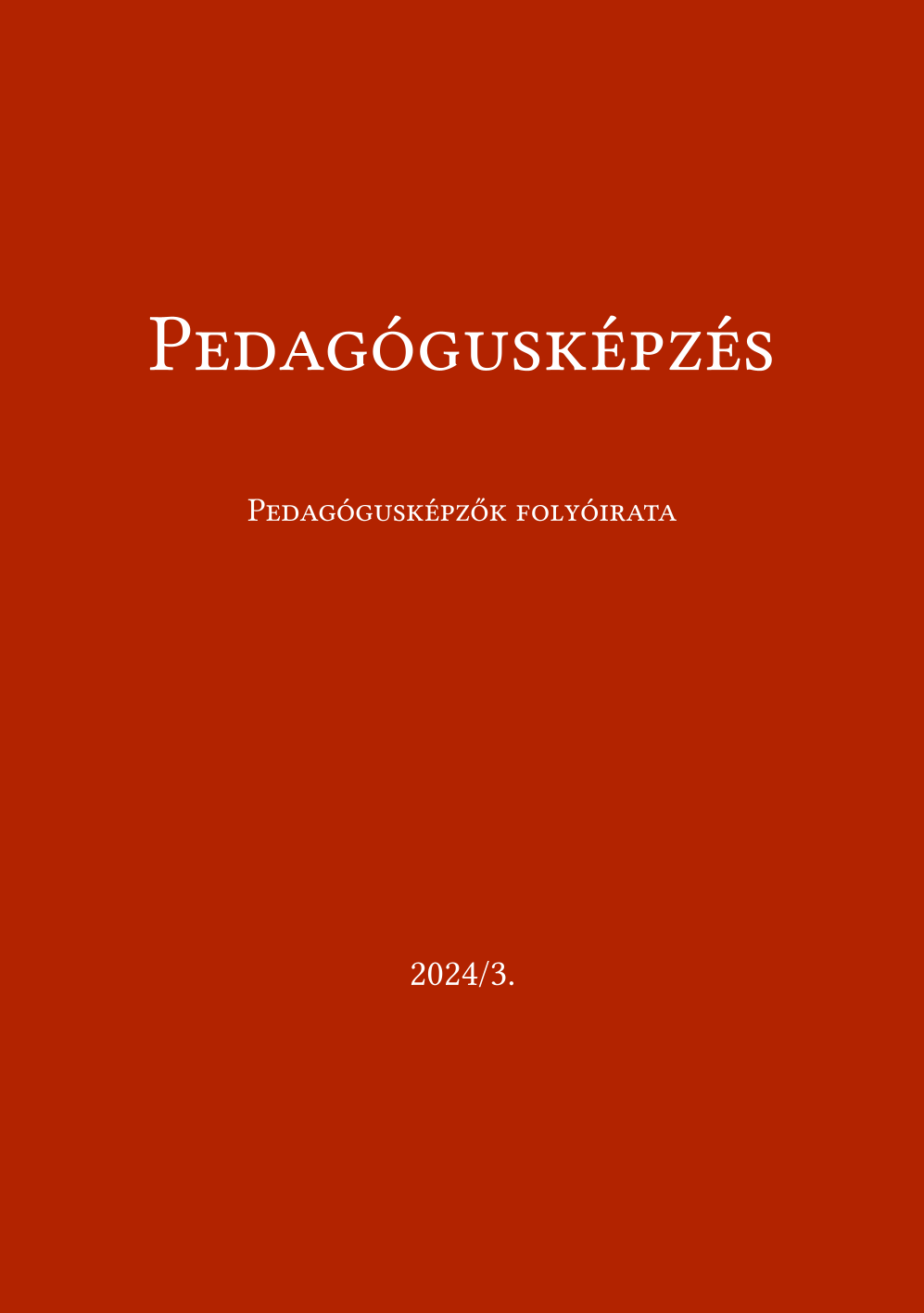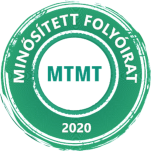A fenntarthatóságra nevelés megerősítése a palesztin tanárképzésben: kihívások és megoldások elemzése a nyelvtudás és a pedagógus továbbképzés javítása érdekében
DOI:
https://doi.org/10.37205/TEL-hun.2024.3.02Kulcsszavak:
fenntarthatóságra nevelés, tanárképzés, nyelvtudás, továbbképzés, a fenntarthatóságra nevelés megerősítéseAbsztrakt
A fenntarthatóságra nevelés elengedhetetlen a palesztin tanárképzésben, tekintettel az ország környezeti, gazdasági és társadalmi problémáira.
Ez a kutatás a palesztin tanárképzés fenntarthatóságra neveléssel kapcsolatos problémáival és a lehetséges megoldásokkal foglalkozik, a nyelvtudásra és a továbbképzésre összpontosítva.
A kvalitatív adatelemzés során a tanárképzést, a nyelvi kompetenciákat és a fenntarthatóságra nevelést vizsgáltuk. Az eredmények azt mutatják, hogy a fenntarthatóságra nevelés megerősítéséhez számos kihívással kell megküzdeni Palesztinában, többek között biztosítani kell a már pályán lévő pedagógusok nagyobb mértékű hozzáférését a témával kapcsolatos továbbképzésekhez és angolnyelv-tudásuk fejlesztését. Két megoldási javaslat merült fel: a szakmai továbbképzési lehetőségek bővítése és hatékonyabbá tétele, valamint a technológia használata a nyelvtudás javítása érdekében.
A kutatók a cikk összegzésében javaslatokat tesz a fenntarthatóságra nevelés megerősítésére a palesztin tanárképzésben a politikai döntéshozók, a pedagógusok és más érdekeltek számára.
Hivatkozások
Arar, K., Zohri, A. A., Zohri, A. A., Alhouti, I., Chaaban, Y., Sawalhi, R. & Salha, S. (2024). A critical analysis of education policy in turbulent times: A comparative study. Power and Education, 16(2), 117–138. https://doi.org/10.1177/17577438231168965
Assaiqeli, A., Maniam, M., Farrah, M., Morgul, E. & Ramli, K. (2023). Challenges of ELT during the new normal: A case study of Malaysia, Turkey and Palestine. International Journal of Arabic-English Studies, 23(1), 377–400. https://doi.org/10.33806/ijaes2000.23.1.20
Badwan, N., Awad, S. & Jbara, L. (2022). The Effects of Education and Sustainable Development on the Palestinian Economy and Business Student Behaviour. South Asian Journal of Social Studies and Economics, 15(1), 29–52. https://doi.org/10.9734/sajsse/2022/v15i130397
Cristillo, L., Iter, N. & Assali, A. (2016). Sustainable leadership: Impact of an innovative leadership development program for school principals in Palestine. American Journal of Educational Research, 4(2A), 37–42. https://doi.org/10.12691/education-4-2A-6
Dweikat, K. & Zyoud, M. (2021). Professional Development and Teaching Practices of EFL Palestinian Teachers during COVID-19 Pandemic: A Case Study of Three Female Teachers. Arab World English Journal (AWEJ) Special Issue on Call (7), 78–93. https://dx.doi.org/10.24093/awej/call7.6
Fahoum, K. & Abuelaish, I. (2019). Occupation, settlement, and the social determinants of health for West Bank Palestinians. Medicine, Conflict and Survival, 35(3), 265–283. https://doi.org/10.1080/13623699.2019.1666520
Hussein, A., Wong, S., & Bright, A. (2024). History and Impact of Israeli Siege and Attacks on Education in Gaza, Palestine. Oxford Research Encyclopedia of Education. https://doi.org/10.1093/acrefore/9780190264093.013.1903
Masry-Herzallah, A. (2024). From social-emotional learning to social-emotional competence in Israeli-Palestinian teachers’ professional development. Teacher Development, 1–20. https://doi.org/10.1080/13664530.2024.2412041
Ministry of Education. (2018). National Teacher Professional Development Framework.
Mora, A., Trejo, P. & Roux, R. (2014). English language teachers' professional development and identities. Profile Issues in Teachers Professional Development, 16(1), 49–62. http://dx.doi.org/10.15446/profile.v16n1.38153
Mushahari, P. & Sharma, H. (2022). Experiential Learning in Pre-Service Teacher Education: Attitude of Teacher Trainees and Challenges Faced. Journal of Positive School Psychology, 6(4), 568–576.
Naser-Najjab, N. (2020). Palestinian education and the ‘logic of elimination’. Settler Colonial Studies, 10(3), 311–330. https://doi.org/10.1080/2201473X.2020.1760433
Nassar, S. (2022). In-service Teacher Empowerment in Palestine: Teacher Training or Professional Development Programmes? In Khine, M. (Ed.) Handbook of Research on Teacher Education: Pedagogical Innovations and Practices in the Middle East (pp. 481–502). Springer Nature Singapore. https://doi.org/10.1007/978-981-19-2400-2_28
Shibib, K. (2021). From higher education in historic palestine towards a pan-Palestinian higher education. Contemporary Arab Affairs, 14(3), 21–54. https://doi.org/10.1525/caa.2021.14.3.21
Shinn, C. (2012). Teacher Education Reform in Palestine: Policy Challenges Amid Donor Expectations. Comparative Education Review, 56(4), 608–633. https://doi.org/10.1086/667434
Smith, J. & Heyward, P. (2024). Policy efforts to meet UNESCO’s Sustainable development Goal 4: A 3-pronged approach. Journal of Education for Teaching, 50(2), 266–279. https://doi.org/10.1080/02607476.2023.2283422
Smith, M. & Scott, H. (2023). Distance education under oppression: The case of Palestinian higher education. Education Sciences, 13(7), 729. https://doi.org/10.3390/educsci13070729
UNESCO (2020). Education: From disruption to recovery. https://en.unesco.org/covid19/educationresponse.
UNRWA (2020). The long term impact of displacement on Palestinian communities: A socio- economic review.
World Bank (2020). How countries are using edtech to support access to remote learning during the COVID-19 pandemic. https://www.worldbank.org/en/topic
Yamchi, N. (2006). English teaching and training issues in Palestine. TESOL Quarterly, 40(4), 861–865. https://doi.org/10.2307/40264318
##submission.downloads##
Megjelent
Hogyan kell idézni
Folyóiratszám
Rovat
License
Copyright (c) 2025 A szerző(k)

This work is licensed under a Creative Commons Attribution-NonCommercial-NoDerivatives 4.0 International License.








